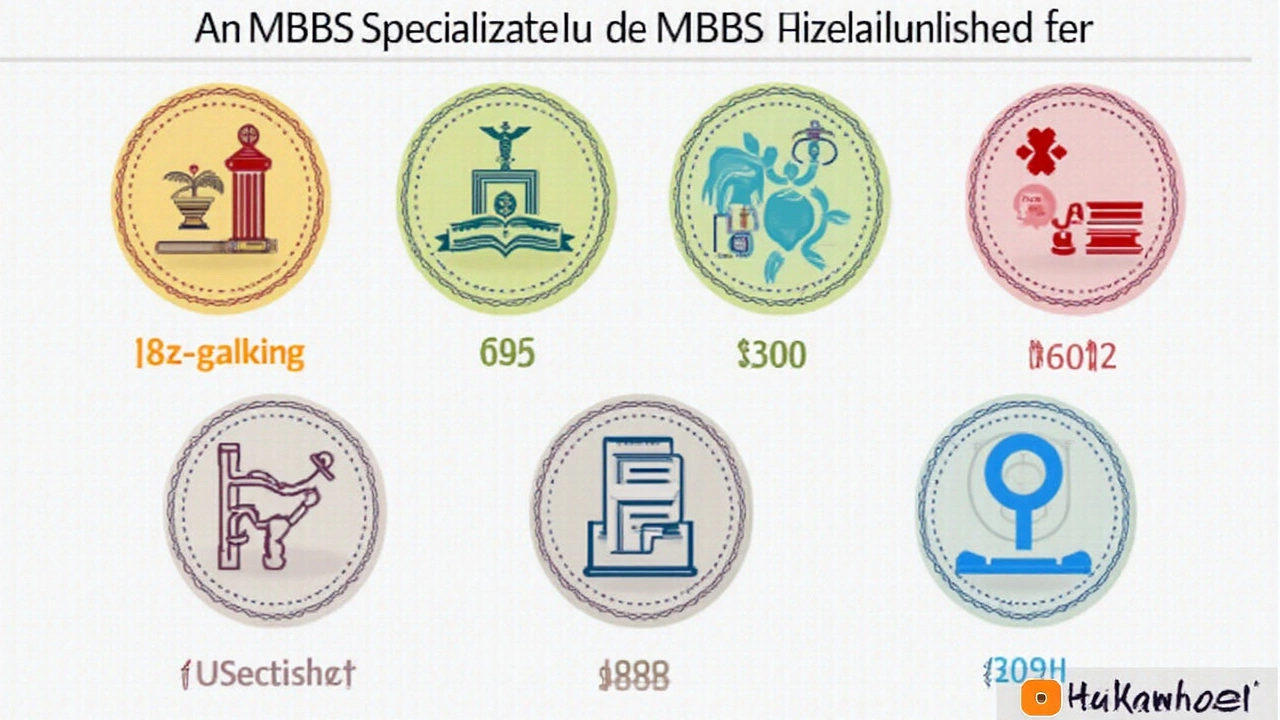Deciding which branch of MBBS to pursue after clearing NEET can be a game-changer for your future earnings. Some specialties not only pay well but also come with exciting opportunities for practicing cutting-edge medicine. But which ones are the top earners?
In recent years, fields like orthopedic surgery, cardiology, and dermatology have become synonymous with big paychecks. These branches stand out not only for their financial rewards but also for how critical and specialized the skills they require are. Doctors in these fields often find themselves at the forefront of innovation, making the work as fulfilling as it is lucrative.
But why do these specializations pay well? It’s all about demand and the complexity of skills needed. The rarer the specialty, the higher the need – and consequently, the higher the pay. Understanding these dynamics can help you choose a path that matches your career goals and lifestyle aspirations.
- The Most Lucrative Specializations
- Factors Driving High Salaries
- Demand Dynamics in the Medical Field
- Tips for Choosing the Right Path
The Most Lucrative Specializations
When it comes to choosing a branch after MBBS, some specializations not only offer exciting challenges but are also incredibly rewarding financially. Knowing which fields stand out can guide you in making a choice that aligns with your career aspirations.
Orthopedic Surgery
Orthopedic surgeons top the list, often earning handsome salaries due to the complex nature of their work. They deal with bones, muscles, and joints, performing surgeries that can significantly alter a patient's life quality. With sports injuries on the rise, there's always a growing need for specialists in this field.
Cardiology
Heart health is a major concern worldwide, making cardiology a highly demanded specialization. The intricate knowledge and skills required to treat heart conditions ensure cardiologists are compensated accordingly. Whether it's intervention procedures, diagnostics, or surgery, this branch is crucial, and rightfully, one of the highest earners.
Dermatology
Who would have thought that dealing with skin could be so profitable? Dermatology has emerged as a lucrative path, thanks to increasing awareness and a growing market for cosmetic procedures. From treating severe conditions to enhancing appearances, dermatologists do it all and get paid well for their expertise.
Urology
Urologists, dealing with urinary tract systems and male reproductive issues, are among the top paid professionals. With an aging population, the demand for these specialists is expected to grow, making it a promising choice for MBBS graduates.
| Specialization | Approximate Annual Salary (USD) |
|---|---|
| Orthopedic Surgery | 500,000 |
| Cardiology | 450,000 |
| Dermatology | 400,000 |
| Urology | 380,000 |
While these numbers can be enticing, it's essential to choose a field you're passionate about. The demands of these specializations require a deep commitment to learning and patient care, so make sure your heart is in it as much as your mind is.
Factors Driving High Salaries
Understanding why some MBBS branches come with higher paychecks can guide your career choices. It’s more than just picking a field—it’s about being strategic about where demand meets your personal interests.
Complexity and Specialization
One major factor is the complexity of the specialty. Specialties that require more advanced training, such as cardiology or neurosurgery, tend to offer higher salaries. The years of additional study, fellowships, and ongoing learning make these fields exclusive and highly valued.
Demand-Supply Dynamics
Demand is a big driver. For example, as our population ages, there's a growing need for specialists like geriatricians and oncologists. Areas with fewer trained doctors often see higher salaries as healthcare systems compete to attract talent.
Technological Advancements
Fields that are technology-intensive or at the cutting edge of medical innovation often have high earning potentials. Orthopedic surgeons, for instance, who perform complex surgeries with innovative tech, find themselves in lucrative positions.
Economic Factors and Region
Economic conditions and regional demands can also affect salaries. In metro areas with a higher cost of living, doctors usually earn more. Similarly, in regions with scarce medical professionals, salaries spike to incentivize qualified doctors to practice there.
| Specialty | Average Salary (USD) |
|---|---|
| Orthopedic Surgery | 400,000 |
| Cardiology | 370,000 |
| Dermatology | 350,000 |
So, when you're planning your career after MBBS, think beyond the immediate. Consider where the needs are, where your passion lies, and how you can balance them with the potential financial rewards.

Demand Dynamics in the Medical Field
Why is it that some medical branches seem to rake in the cash while others don't? It's all about supply and demand. Think of it this way: the more unique and complex a specialty is, the higher the demand, which naturally pushes up the pay scale.
Specialties like cardiology and orthopedic surgery are highly sought after because they deal with life-threatening conditions. There will always be a stream of patients, meaning doctors in these fields are always in demand. On the other hand, fields like dermatology, while not always dealing with life or death situations, attract lucrative cosmetic procedure markets with high demand.
Making Sense of the Numbers
To put this in perspective, look at some numbers. A recent study showed that cardiologists and orthopedic surgeons top the income list among specialties, earning over $400,000 annually on average. It's not just about the procedures themselves but also the expertise involved. There tends to be a limited number of practitioners in these fields, which means their skills are at a premium.
Geography Matters
The demand doesn't just depend on the medical field—it can also vary greatly depending on where you are. For instance, rural areas often have a higher demand for general practitioners and certain specialties due to fewer practicing doctors. A move to a less densely populated area might yield better opportunities and compensation for young doctors willing to make the shift.
Look closely at where the greatest needs are and align that with your interest. Playing the demand and supply game can make a big difference in how much you earn and how satisfied you are in your career.
| Specialty | Average Income | Geographical Demand |
|---|---|---|
| Cardiology | $430,000 | Urban |
| Dermatology | $390,000 | Varied |
| General Practice | $200,000 | Rural |
Tips for Choosing the Right Path
Choosing a specialization after MBBS is a big decision that shapes your career. Not sure where to start? Here are some tips to help you make an informed choice.
Assess Your Interests and Strengths
First off, think about what you love about medicine. Is it the hands-on aspect, the diagnostic challenges, or perhaps something else? Knowing what drives you can direct you towards a specialty that aligns with your passions. Your interests will keep you motivated through the long hours and challenging scenarios.
Consider the Demand and Lifestyle
It's important to look at which MBBS branches are in high demand. Specialties like cardiology and dermatology not only come with high pay but also a stable demand. Remember, a lucrative field often means odd hours and a demanding schedule, so consider if you're up for the lifestyle that comes with high-paying jobs.
Research Potential Earnings
While passion is key, potential earnings can influence your decision too. Look into which medical careers offer better financial opportunities. Fields like orthopedic surgery and cardiac surgery are known for high salaries, but they also require intense training and commitment.
Think About the Long-Term
Will this specialty still interest you in the next decade? The medical field is always evolving, so pick a branch that not only intrigues you now but will likely evolve in ways that excite you.
- Talk to professionals in the field to get first-hand insights.
- Attend related workshops and seminars.
- Consider future advancements and how they could impact your chosen specialty.
Your path should reflect a balance between passion, lifestyle, and income aspirations. Do thorough research and soul-searching before making a decision. Making an informed choice now can lead to a fulfilling career later.













